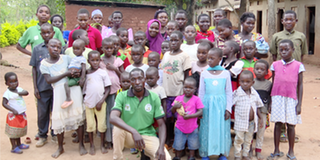
Tito Wanaale, 42, with his children in Buluuba Village, Makanga Sub-county, Buyende District. photo/ SAM CALEB OPIO
SAM CALEB OPIO
A 42-year-old man from Buluuba Village, Makanga Sub-county, Buyende District, who has fathered 34 children with 12 women, has set his sights on raising that number to 50 before he turns 55.
Driven by the painful memory of an only child, Tito Wanaale is determined to ensure he has plenty of helping hands around him.
Wanaale in 2000 married his first wife, who was only aged 15. Two years later, she gave birth to their first son, who is now 22 years old .
However, he felt his first wife was “weak” in handling farm work and frequently visited her parents, which led him to seek a second wife for additional support and companionship.
Despite having two wives at such a youthful age, Wanaale’s nagging worries of loneliness could only be allayed by taking on six more wives, plus four other undocumented ones, taking his tally of women to 12.
As Wanaale’s worries about loneliness persisted, he expanded his family further, eventually marrying 12 women. His strategy, he says, was not only to have more children but also to avoid the risks associated with infidelity.
“With all these wives, I didn’t need to look for others and risk contracting diseases; none of them felt important and put me on pressure because they knew I had alternative wives,” he says.
Aware of the financial challenges of a large family, Wanaale says he has constructed 50 rental houses for his children and set up several businesses.
Despite these preparations, he admits that the businesses run by his wives have struggled to succeed, with many of them collapsing in infancy.
Feeding such a large family is a daily challenge, with Wanaale reportedly spending around Shs30,000 on sauce alone each day. To manage healthcare costs, he practices self-medication, stocking up on common medications like Coartem, an antimalarial drug, to treat his children when they fall ill.
“Every week, I must have a child falling sick, which pushed me to buy tablets like Coartem (an antimalarial drug),” he adds.
Wanaale says most of his children are in Universal Primary Education (UPE) schools, while a few are in privately-owned institutions.
The man has parted ways with some wives, especially those who wanted to adopt family planning as a birth control measure, which he opposed.
Wanaale’s first two wives, who he describes as “old and tired,” have asked to be excused from further childbearing, prompting him to consider adding two younger wives to help achieve his goal of 50 children.
“My first two wives are tired and have asked me to excuse them from giving birth; they can no longer handle the stress of giving birth,” he says.
To keep healthy, Wanaale says he avoids sweet foods, excessive fats and undertakes frequent exercises. He never warns any of the wives whenever he plans to visit them.
Zadujja Namulondo, his fourth wife and mother of five children, says she is content with the arrangement.
“Whenever our husband gets a new wife, he introduces her to us so that we get to know each other better,” Namulondo, who has five children, says.
However, she has informed him that she is done having children and supports his plan to marry more women.
To keep them together, Namulondo says Wanaale has strict rules and has advised whoever can’t abide by them to leave at will.
“He is too strict and reserved, but once you understand someone’s weakness it’s easy to deal with them,” she says.
Esther Mirembe, the first wife and eldest, said when she discovered that she couldn’t fit into her man’s dream of siring all his 50 children alone, she advised him to marry more women.
Preliminary statistics from the 2024 National Population and Housing Census indicate that Uganda’s fertility rate has declined to 4.3 births per woman, down 2.2 percent from 2023.
“It’s not easy to be in a marriage with other women, but I had nothing to do. I now find no problem living with them and sharing a husband,” Mirembe, a mother-of-six, adds.
With the current family size, Mirembe says they can dig more than an acre of land in a day, making them more productive.




